
Boss Shares Why He Denied A Female Employee’s Request To Move Her To 80% Time
Interview With AuthorThe difference between a good boss and a bad one is the same as with any other colleague—the best of the best go the extra mile to ensure that their employees are supported and in the best possible position to showcase their talents and skills.
Canadian Aaron Genest, who is the president of SaskTech and works at Siemens Digital Industries, told one of her employees “no” when she asked if he could move her to 80 percent time. But before you rush ahead and judge, keep in mind that it’s a story with a twist. Kick back with a mug of tea, read through Genest’s tweets, and then let us know what you thought of the situation, dear Pandas!
Check out Bored Panda’s interview with Genest, as well as with Eddy Ng, the James and Elizabeth Freeman Professor of Management at Bucknell University in Lewisburg, Pennsylvania. They’ve got some amazing insights into the unequal division of labor at home, how to support employees during the pandemic, and the importance of small teams that thoroughly support their members.
When a female employee asked her boss if she could move to 80 percent time, he refused. But it’s a story with a wholesome twist
Image credits: Nenad Stojkovic (not the actual photo)
Image credits: AaronGenest
Image credits: AaronGenest
Image credits: AaronGenest
Image credits: AaronGenest
Image credits: AaronGenest
Image credits: AaronGenest
Image credits: AaronGenest
Image credits: AaronGenest
Image credits: AaronGenest
Image credits: AaronGenest
Like some internet users admitted on Twitter and on Imgur, they totally weren’t expecting Genest to pull a good old switcheroo and explain the wholesome reason why he refused to reduce his employee’s working hours. He didn’t want his colleague’s career to suffer just because she’ll be spending more time at home taking care of the family.
Genest told Bored Panda that he’s thrilled that the issue is getting more attention after his thread got so much attention online. “I’m also pleased that Siemens (my employer, with 350,000 employees) reached out to me from headquarters in Germany to tell me that my message matched their ethic and offered to help manage the deluge,” he said. “I actually didn’t quite realize that I had put the bait and switch into the thread until people pointed it out. I guess I have a bit of a dry sense of humor and that was my natural approach to storytelling. It turns out that it works.”
Creating equality at home depends on a lot of factors
But what could be done to make sure that the division of labor back at home could be made more equal? Does the responsibility fall on everyone as individuals or can institutions pitch in to change the situation? In Genest’s opinion, it’s a multifaceted question with no clear or simple solution. “Certainly, there’s a role across all levels of society. Normalizing flexible employment opportunities where possible will go a long way to helping women achieve parity in high-performing jobs, especially if you emphasize outcomes over hours. But that ignores the challenges of service jobs, very small businesses, access to education, maternity support, and more.”
Genest said that when families debate how to manage finances and home environments, the “rational decision” is (too often) for the woman to leave or reduce her employment because she earns less. Governments can have an impact on this by passing equal pay laws, giving access to high-quality childcare options, enforcing paternal leave like in Sweden, as well as “reinforcing” the economic value of women in the workforce.”
Meanwhile, employers and companies can consider what they can do to invest in their employees in the long-term. “And obviously, the rest of us can think carefully about how we frame these issues and support those around us. But there’s certainly no magic bullet. I’m optimistic that we’ve been heading in the right direction, but there’s a long way to go and the pandemic certainly hasn’t helped.”
Teams supporting each other like small communities is the way forward
We also spoke to Genest about what companies can do to further support all of their employees during the pandemic. “I think the Siemens approach of outcomes over hours and flexible work conditions (40% time at home) is a good one. But the devil is in the details. Lots of jobs have incentives built in that encourage over-performance, creating conditions where those without family responsibilities are naturally situated to be able to contribute more and, in the end, advance more quickly. It’s likely impossible to address this without addressing the constant need for accelerated growth in publicly traded companies—and that’s not likely to change any time soon,” he gave his take on the question.
Genest highlighted that team cohesion can lead to wonderful results, as well as constant support from colleagues. This highlights the importance of (at least limited) autonomy within bigger structures. “Within organizations, small teams can be communities that pull together. When we look at how small communities (cul de sacs, villages, etc.) work together to support those with challenges by contributing without expectation of further recognition, we can see a model of teams within companies that work as a unit,” he said.
That’s exactly the model that he’s been trying to apply to his team. “As my team members move through life stages and conditions, they need different supports and have different levels of contribution. Across the team, it’s my hope that, because they’re highly motivated and enthusiastic, we perform highly, even if the highest performer position shifts over time. By recognizing small teams instead of individuals, I think there’s a path forward.”
The pandemic disproportionately affects women
Meanwhile, we spoke about how and why the pandemic is disproportionally affecting women workers with Professor Ng from Bucknell University. “Women are overrepresented in lower-paying and precarious jobs such as those in retail, service, and hospitality where there is little job security and benefits. Men on the other hand are found in industries that are deemed essential, such as transportation (delivery) and construction,” Professor Ng told Bored Panda.
He stressed the fact that a lot of retail and hospitality businesses “scaled down as a result of COVID” restrictions or went bankrupt. This led to more women being laid off or being displaced from their jobs. He highlighted that the situation is even worse for “women of racialized backgrounds.”
“Women reorganize their work around family demands, men often do not”
Some were hoping that the lockdowns and working from home would eventually lead to greater equality between partners and how they share chores and family duties at home. Unfortunately, the reality very different.
“Women, even those in professional and managerial jobs, continue to take on a second shift (caring for family) after the first shift at the office. We continue to subscribe to gender roles, even in many egalitarian societies,” the professor said, pointing out that this explains the “persistent pay gap and an underrepresentation of women in senior management and higher-paying jobs.”
Meanwhile, Professor Ng stated that during a lockdown, men’s higher-paying careers are prioritized over women’s which are generally seen to be “supplemental income” even in the West.
“Women reorganize their work around family demands, men often do not. Unequal division of labor is exacerbated when a family could no longer access paid help (COVID restrictions), and women will have to pick up the slack.”
Here’s how people reacted after reading Genest’s story
Image credits: corajanzen
Image credits: rjg948
Image credits: stevieannie
Image credits: ja2cook
Image credits: amandaschutzie
Image credits: Kerry87183816
According to the Harvard Business Review’s article from September 2020, the Covid-19 pandemic risks “sending into reverse” the progress toward greater gender equality achieved over the past 5 years. The HBR writes that women’s jobs are 1.8 times more vulnerable to the coronavirus crisis than men’s.
“Women make up 39% of global employment but account for 54% of overall job losses as of May 2020. At the same time, the burden of unpaid care, which has risen in the pandemic, falls disproportionately on women,” the article details the unequal risk and burden that female employees are facing.
Meanwhile, Forbes writes: “Women have had to take on the lion’s share of extra childcare and education for their families, as a result of continuing Covid challenges like school closures, remote learning, and limited daycare operations.”
With his post gaining popularity both on Twitter and outside of it, Genest used the opportunity to announce that Siemens is looking for a new software developer in Saskatoon, Canada. So if you live nearby, you’ve got the qualifications, and you want to work with an obviously caring team, go drop them a line and send them your CV. You never know, Genest’s next wholesome Twitter post could be about you.
When not working in the tech world, Genest loves spending time with his family. What’s more, he’s got a variety of interests, from music and gaming to cycling. He’s also passionate about helping people get “tech jobs where they’re needed,” according to his Twitter bio.
401Kviews
Share on FacebookHis employee will be even more productive because he's taken a huge stress away from her. A win-win situation.
Yeah. She's getting the time she needs and she's not losing income. Personally I'd be way more motivated to do my work well after that.
Load More Replies...My boss let me from from home, which is totally possible for software developers. I feel extremely privileged that I can work from home, while many still can't and I wouldn't ask for more. Since I don't lose like 2-3 hours a day for commuting only, I can even work longer from home if needed.
@David Retsler One that deserves attention. It doesn't matter if he did this out of a hunger for internet fame or genuine care for his staff, the fact is he did a really good thing and it sets a great example.
Load More Replies...A thousand times yes!!! He’s the type of man I’ve been championing. They don’t grow on trees. They choose what they stand for, and it’s not easy but I’m guessing he thinks it’s worth it to foster that community. His post really made me happy and deliriously optimistic again. Not all women, but I’m suspecting that the women he’s talking about work two jobs. They (statistically) already make less than men for the same job, go home and work the second if not third job of the day. With the pandemic, the pressures of cutting back their hours/ blocking off time/ or staying at home falls on them to take on childcare/ homemaking/ and educating. This devastated the progress we’ve made in the workforce. If more companies gave fathers/husbands/ men the same consideration, we wouldn’t have this unfair expectation put on us and would equalize the dynamics somewhat (it’s more complex than that and more situations, but that’s another comment).
I’m sure a lot of men would like to be more present in their children’s and (aging parents’) lives. Do your best and try to help others when you can. S**t happens. If they’re good people, they’ll have your back however they can. He’s one of the “not all men” guys; he fostered a supportive environment and spread the message. Actions and words of a great man, which we would do well to note.
Load More Replies...Wish this guy could talk to an ex-manager of mine who used my **government approved compassionate care leave** (to help look after my dying father - who died about 3 weeks after approval, btw) - as an example of "poor attendance at work" and then went on to use that as a reason why I should not be provided a raise, but also why I should be written up.
I love this post but don't love that this boss's response is not the standard. My superstar boss had the same response to my concerns about balancing childcare with work in this pandemic - I am grateful to have a wonderful boss but shouldn't feel 'lucky' - all workers should get this kind of great treatment.
My boss isn't just a boss, he's almost like family. When my sister and I moved into our apartments, he got someone else who works for him to help us move in and didn't charge us a penny. My sister and I have allergies, so instead of giving us perfume for Christmas like he did the rest of the female employees, he paid a month of our rent to own bill. Our mother works with us and when she had to go to Dallas to pick up our dad from the hospital and couldn't get a hotel on short notice, he let her and my aunt spend the night at his house in Dallas. This man does a lot for his employees and shows that he really cares about us.
I love this employer, but not near as much as he is loved by his employees.
Who has not at some point in life struggled to juggle the time vs practical requirements? The way to solve it is to expect the work to be done, just not always at a specific time. Work with people, be flexible, re-arrange the workloads, but look after the people. It pays off for everyone in the end, and you end up getting happier and more loyal staff. People who feel valued, do more and are more creative in what they do. Also, sometimes, it's not about working more or harder, but smarter. Find a clever way to do the job quicker, delivering the same, and who could tell? Being a jerk about things like this, is never a solution, it just comes back to bite everyone involved in the end.
This made my heart swell. AARON IS A FANTASTIC HUMAN BEING AND GREAT BOSS.
I had a boss who was pissed because I chose to stay home with my sick child (maybe 3 times that entire year) - and mentioned it in my annual performance review. He literally asked "why can't your husband do it". I looked him dead in the eye and said, "Why don't we get your wife on the phone and ask her how many times you stayed home when YOUR children were sick"? He decided not to put it in the report. Smart guy - I would have screamed discrimination in a heartbeat.
I've been lucky to be able to work from home since this mess started. However, because our company is so busy I've been working 12 hour days. I'm paid for working eight hours a day. I receive NO overtime with an exempt / salaried position. I really feel for those who have young kids at home. Our employer expects the job to be done whenever you can do it. Some are working at 1:00 AM!
My question is why is she having to bend to her husband's needs? Far, FAR too many women are taking on way too much during this pandemic. But major Kudos to her boss!! He seems to be looking out for this woman more than her husband is.
The husbands do it because they can. The neat trick here is that if the caretaking work isn't done, the one who suffers is the child. The husband doesn't suffer. So what's the incentive for the husband to take on a major caretaking responsibility rather than just keep going as before and assume that Mommy will sort it all out?
Load More Replies...His employee will be even more productive because he's taken a huge stress away from her. A win-win situation.
Yeah. She's getting the time she needs and she's not losing income. Personally I'd be way more motivated to do my work well after that.
Load More Replies...My boss let me from from home, which is totally possible for software developers. I feel extremely privileged that I can work from home, while many still can't and I wouldn't ask for more. Since I don't lose like 2-3 hours a day for commuting only, I can even work longer from home if needed.
@David Retsler One that deserves attention. It doesn't matter if he did this out of a hunger for internet fame or genuine care for his staff, the fact is he did a really good thing and it sets a great example.
Load More Replies...A thousand times yes!!! He’s the type of man I’ve been championing. They don’t grow on trees. They choose what they stand for, and it’s not easy but I’m guessing he thinks it’s worth it to foster that community. His post really made me happy and deliriously optimistic again. Not all women, but I’m suspecting that the women he’s talking about work two jobs. They (statistically) already make less than men for the same job, go home and work the second if not third job of the day. With the pandemic, the pressures of cutting back their hours/ blocking off time/ or staying at home falls on them to take on childcare/ homemaking/ and educating. This devastated the progress we’ve made in the workforce. If more companies gave fathers/husbands/ men the same consideration, we wouldn’t have this unfair expectation put on us and would equalize the dynamics somewhat (it’s more complex than that and more situations, but that’s another comment).
I’m sure a lot of men would like to be more present in their children’s and (aging parents’) lives. Do your best and try to help others when you can. S**t happens. If they’re good people, they’ll have your back however they can. He’s one of the “not all men” guys; he fostered a supportive environment and spread the message. Actions and words of a great man, which we would do well to note.
Load More Replies...Wish this guy could talk to an ex-manager of mine who used my **government approved compassionate care leave** (to help look after my dying father - who died about 3 weeks after approval, btw) - as an example of "poor attendance at work" and then went on to use that as a reason why I should not be provided a raise, but also why I should be written up.
I love this post but don't love that this boss's response is not the standard. My superstar boss had the same response to my concerns about balancing childcare with work in this pandemic - I am grateful to have a wonderful boss but shouldn't feel 'lucky' - all workers should get this kind of great treatment.
My boss isn't just a boss, he's almost like family. When my sister and I moved into our apartments, he got someone else who works for him to help us move in and didn't charge us a penny. My sister and I have allergies, so instead of giving us perfume for Christmas like he did the rest of the female employees, he paid a month of our rent to own bill. Our mother works with us and when she had to go to Dallas to pick up our dad from the hospital and couldn't get a hotel on short notice, he let her and my aunt spend the night at his house in Dallas. This man does a lot for his employees and shows that he really cares about us.
I love this employer, but not near as much as he is loved by his employees.
Who has not at some point in life struggled to juggle the time vs practical requirements? The way to solve it is to expect the work to be done, just not always at a specific time. Work with people, be flexible, re-arrange the workloads, but look after the people. It pays off for everyone in the end, and you end up getting happier and more loyal staff. People who feel valued, do more and are more creative in what they do. Also, sometimes, it's not about working more or harder, but smarter. Find a clever way to do the job quicker, delivering the same, and who could tell? Being a jerk about things like this, is never a solution, it just comes back to bite everyone involved in the end.
This made my heart swell. AARON IS A FANTASTIC HUMAN BEING AND GREAT BOSS.
I had a boss who was pissed because I chose to stay home with my sick child (maybe 3 times that entire year) - and mentioned it in my annual performance review. He literally asked "why can't your husband do it". I looked him dead in the eye and said, "Why don't we get your wife on the phone and ask her how many times you stayed home when YOUR children were sick"? He decided not to put it in the report. Smart guy - I would have screamed discrimination in a heartbeat.
I've been lucky to be able to work from home since this mess started. However, because our company is so busy I've been working 12 hour days. I'm paid for working eight hours a day. I receive NO overtime with an exempt / salaried position. I really feel for those who have young kids at home. Our employer expects the job to be done whenever you can do it. Some are working at 1:00 AM!
My question is why is she having to bend to her husband's needs? Far, FAR too many women are taking on way too much during this pandemic. But major Kudos to her boss!! He seems to be looking out for this woman more than her husband is.
The husbands do it because they can. The neat trick here is that if the caretaking work isn't done, the one who suffers is the child. The husband doesn't suffer. So what's the incentive for the husband to take on a major caretaking responsibility rather than just keep going as before and assume that Mommy will sort it all out?
Load More Replies...

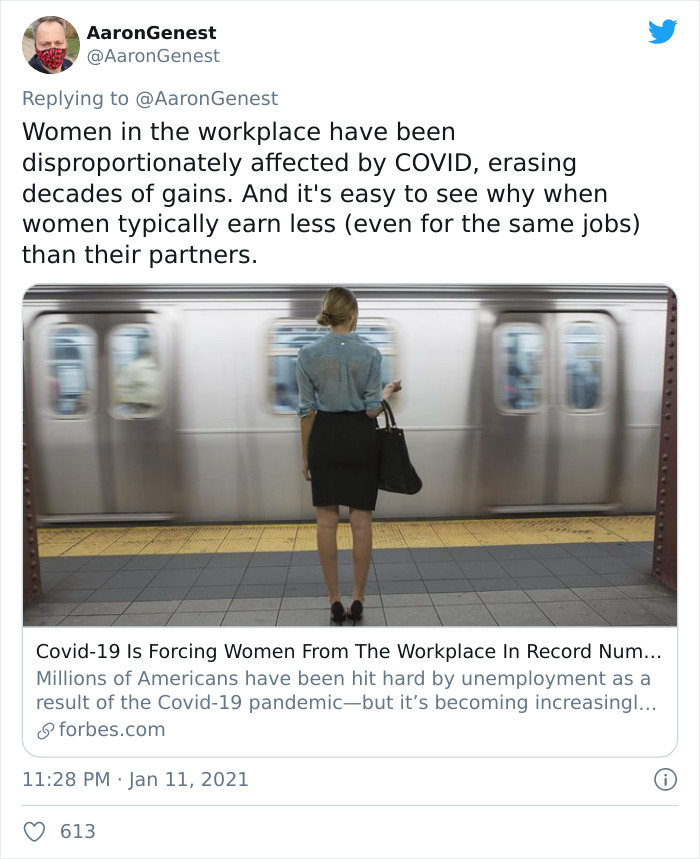
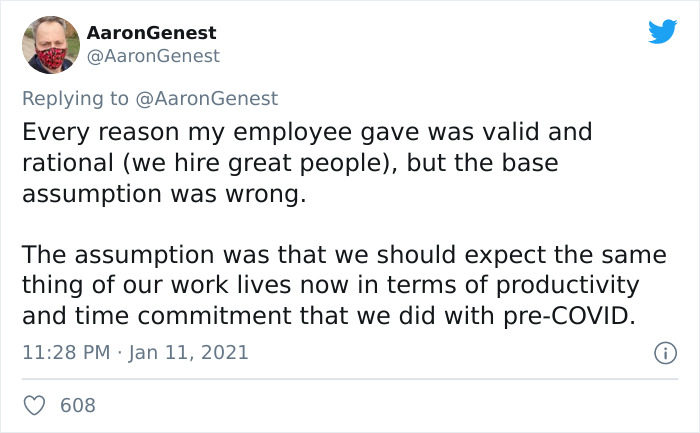
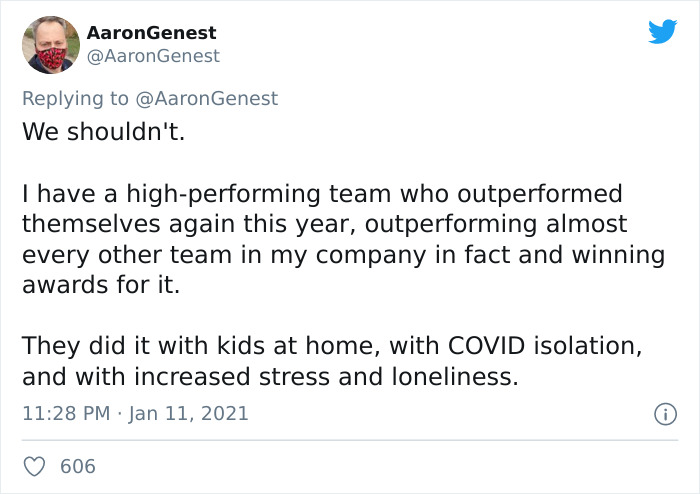
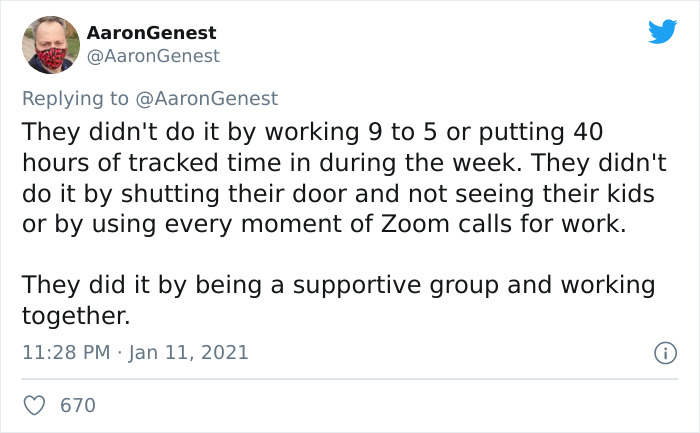



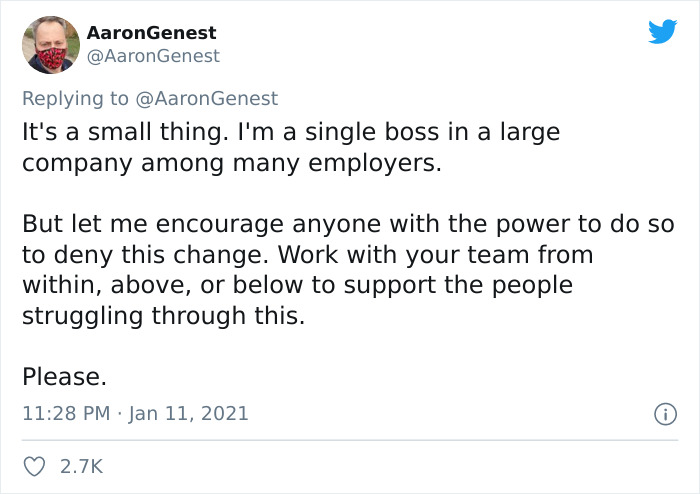


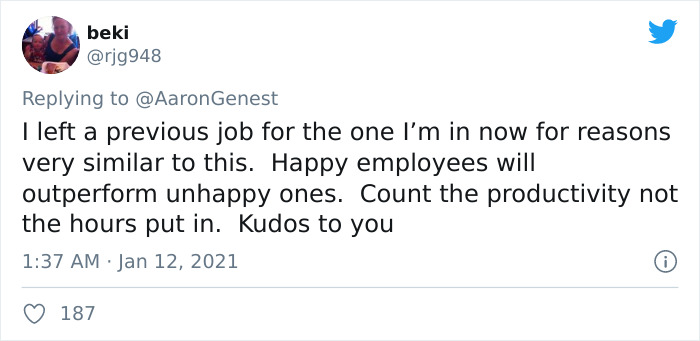

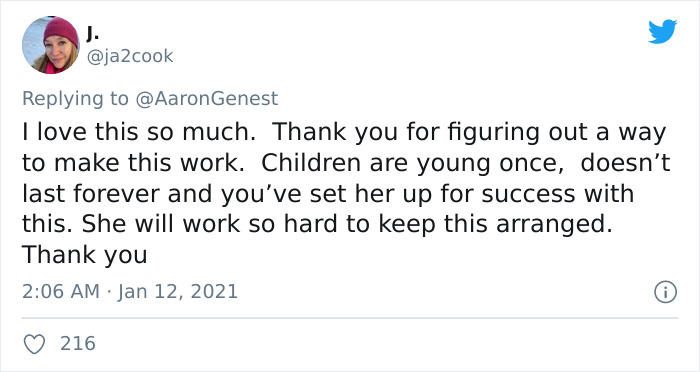









237
31